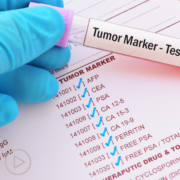How Do Biomarker Test Results Impact a Prostate Cancer Patient’s Prognosis?
How Do Biomarker Test Results Impact a Prostate Cancer Patient’s Prognosis? from Patient Empowerment Network on Vimeo.
How can a prostate cancer patient’s prognosis be impacted by biomarker test results? Dr. David Wise shares insight about biomarkers that are important in determining higher risk prostate cancer.
Dr. David Wise is Director of Genitourinary Medical Oncology at the Laura and Isaac Perlmutter Cancer Center at NYU Langone Health. Learn more about Dr. Wise.
See More From INSIST! Prostate Cancer
Related Resources

|

Prostate Cancer Testing: What Tests Should You Advocate For? |

How Do Biomarker Test Results Impact Prostate Cancer Treatment Options? |
Transcript:
Dr. David Wise:
Great question. So, every biomarker needs to be considered independently.
And whether it adds additional prognostic information to the other variables that we’ve already collected. And so, there are a few different biomarkers that we can discuss. I think that perhaps the most well-known, and in some sense very important one, is the one I mentioned before, which is the abnormal BRCA2 gene test results.
So, patients who have that hereditary genetic mutation with BRCA2, we do have evidence that those cancers at diagnosis tend to have a higher Gleason score. They tend to be higher risk. Those cancers are still curable. Those cancers are still very treatable, but they tend to be less common in that low-risk category. So, we tend to be, at times, a bit more reluctant to manage patients with BRCA2 with surveillance alone, because their cancers typically need more intensive treatment.



